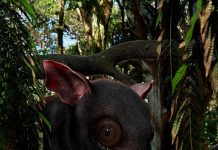
Researchers at The University of Western Australia have discovered that magpies that are aggressive towards other members of their group tend to be less intelligent.
This study, led by Dr. Lizzie Speechley from UWA’s School of Biological Sciences, was published in the Proceedings of the Royal Society B.
Magpies live in cooperative social groups, and this research suggests that being mean to your group members is not beneficial.
The study focused on wild Western Australian magpies, Gymnorhina tibicen dorsalis, and examined how their social interactions and group size influence their intelligence.
The researchers looked at the social networks of the magpies, including how they interacted with each other through proximity, friendly behavior, aggression, and vocal communication.
They studied 18 groups of magpies, with each group containing between 80 and 120 individuals.
To test the magpies’ intelligence, the researchers used a wooden grid with color-coded lids.
The lids swiveled when pecked, and if the magpie pecked the correct lid, it received a food reward. This test measured the birds’ ability to learn and remember information from their environment.
Dr. Speechley explained, “We found that magpies in larger groups performed better on learning tasks. However, a magpie’s position in the social network also affected their performance. Magpies that were often on the receiving end of aggression did better, while those that were aggressive towards others did worse.”
This finding supports the “necessity drives innovation” hypothesis, which suggests that individuals who cannot monopolize resources through aggression will spend more time solving new problems.
In other words, if a magpie can’t get what it wants by being mean, it has to find other ways to succeed, which can make it smarter.
Dr. Speechley added, “Group size is often used to measure social complexity, but this doesn’t always capture the variation in social dynamics within the group. Our study shows that the way magpies interact with each other plays a significant role in their intellectual development.”
In summary, this research highlights that being aggressive in a social group is not advantageous for magpies. Instead, those who face aggression are more likely to develop better problem-solving skills.
This study provides new insights into how social interactions can drive the evolution of intelligence in animals.
Source: University of Western Australia.



